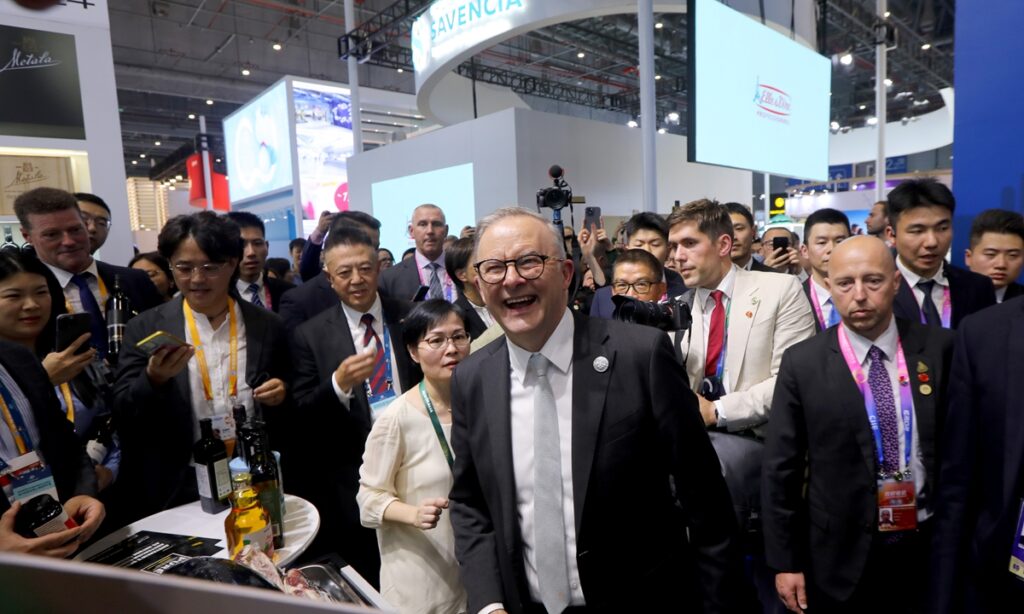While calling for Australia to withstand challenges and pressure from external forces, Chinese observers believe Australian Prime Minister Anthony Albanese’s ongoing visit to China marks another historic moment in bilateral relations and imbues great significance in improving ties. They predicted that this landmark visit will pave the way for the two Asia-Pacific partners to resume summit diplomacy and facilitate more cooperation and strategic dialogue.
The observers’ remarks came as Albanese embarked on his first visit to China since taking office.
“This is my seventh visit to the People’s Republic of China, but my first as Prime Minister of Australia,” Albanese said in a speech at the opening ceremony of the 6th China International Import Expo in Shanghai on Sunday.
“Australia will co-operate where we can, disagree where we must and engage in our national interest… Dialogue with China is vital to helping secure peace, prosperity and security in our region and globally, and to navigate the challenges and opportunities our region will face this century,” Albanese said in another speech in Shanghai on Sunday.
Arriving in Shanghai on Saturday, Albanese started his four-day China trip, the first Australian prime minister to visit China inseven years. His visit came after China’s Ministry of Commerce announced on October 22 that Beijing had reached an agreement with Canberra on a “proper resolution” to trade disputes over wine and wind towers.
Chinese leaders will meet and hold talks with Albanese for in-depth exchanges of views on bilateral relations and international and regional issues of mutual interest, a spokesperson of the Chinese Foreign Ministry said on Friday.
Chinese observers reached by the Global Times all affirmed the significance of Albanese ongoing China visit.
The visit is expected to facilitate the restoration of summit diplomacy and face-to-face communication for the top leaders of both countries, Yu Lei, chief research fellow at the Research Center for Pacific Island Countries of Liaocheng University, told the Global Times on Sunday.
The main focus of attention during Albanese’s visit is expected to be on issues related to the economic and trade relationship between the two countries, the restoration of interrupted human rights and strategic dialogue mechanisms, and on strengthening communication and exchanges on regional issues of mutual concern, Yu said.
Since his predecessor as Australian leader, Scott Morrison, was in office from 2018 to 2022, these mechanisms were suspended, leading to the securitization, politicization, and even demonization of the bilateral relationship. After about one year in power, the current Labor government is taking measures to gradually return to the mature and pragmatic foreign policy trajectory, especially toward China, Yu noted.
Considering that Albanese has characterized ties with China as “mature,” Chen Hong, director of the Australian Studies Center at East China Normal University, said mature bilateral ties can withstand various challenges and pressure.
Different from Albanese’s recent visit to the US, which Chen described as “awkward and disappointing,” the Australian leader’s China visit is expected to yield substantial results conducive to mutually beneficial relations, according to Chen.
But given that Australia considers the US-Australia alliance as a cornerstone of its foreign policy, the ongoing attempts by the US to sow discord between China and Australia will pose a greater demand and challenge to the leadership abilities, political acumen and steadfastness of Australian leaders. They should possess better control capabilities in order to prevent the Asia-Pacific region from descending into chaos, and instead they should work together with China to maintain stability and prosperity in the region, Chen stressed.
“There is no historical grudge between China and Australia, nor is there any fundamental conflict of interest. The two countries can become mutually beneficial partners,” Xiao Qian, Chinese Ambassador to Australia, said in an article published in the People’s Daily on Saturday.
Since the establishment of diplomatic relations in 1972, bilateral trade volume has increased from less than $100 million to $220.9 billion in 2022. China has long been Australia’s largest trading partner, export market and source of imports, said Xiao in the article.
The Chinese envoy cited a report recently released by an Australian research institution showing that bilateral trade between Australia and China has increased the average income of Australian households by AU$2,500 ($1,628) compared to the previous fiscal year, and the bilateral economic relationship supports approximately 570,000 domestic job positions in Australia.
Xiao revealed that there are 1.2 million Chinese living in Australia, which has become an important part of Australia’s multicultural society. In the first half of this year, the number of Chinese students studying in Australia reached 133,000, accounting for 21 percent of the total international student population in Australia.
Xiao pointed out there is also enormous potential for cooperation between the two countries in areas such as climate change and clean energy.
(Global Times)




